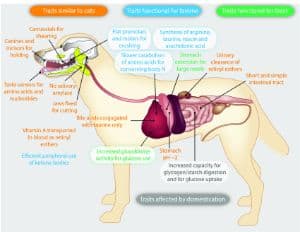For the last few years, grain-free commercial dog foods have been under fire for possibly being linked to an increase in heart disease in some dogs. The Food and Drug Administration alerted pet owners and veterinarians in 2018 after a surge of dilated cardiomyopathy, or DCM, cases appeared in dogs – breeds that are not usually prone to this type of heart disease – who ate commercial dog foods containing pulses, seeds, or potatoes as the main ingredients – ingredients that are often found in boutique, exotic, or grain-free dog foods.
In 2019, the FDA issued another press release regarding the potential connection between grain-free commercial dog foods and DCM, reporting that multiple factors were involved, and more research was needed. Since then, scientists and veterinarians have been investigating a possible link between all commercial dog foods – grain-based and grain-free, and taurine deficiency, as they relate to the increase in cases of dilated cardiomyopathy in dogs.

Photo Courtesy: Pixabay
Dana Brooks, CEO and president of the Pet Food Institute, which encompasses the vast majority of pet food and treat products in the U.S. and provides information and advocacy for its members, told NBC News, “Current research suggests that a variety of factors may influence the development of DCM in dogs. The number of submitted DCM reports suggest that, if diet is a factor, it may be among several elements involved, such as individual dog physiology.”
Dilated cardiomyopathy, or DCM, is a form of heart disease in dogs that specifically affects the heart muscle. The heart is unable to pump enough blood to the rest of the body, which can result in congestive heart failure – common among some breeds, such as golden retrievers, and other large breeds like great danes, doberman pinschers, and saint bernards. Common factors for developing DCM include genetics, infections, toxins, inflammatory diseases, and nutritional deficiencies.
It has long been recognized that taurine deficiency plays a vital role in causing diet-related DCM in some animals. Both humans and dogs synthesize taurine in the liver, but some dogs may be deficient in synthesizing taurine and require more from their diet. Researchers and scientists are now focused on the possible link between all commercial dog foods and taurine deficiency in dogs who later present with DCM.
Taurine, though not considered essential, is an amino acid required by the heart to remain healthy. It’s the only amino acid to conjugate (transfer genetic information) in the liver. Since it’s normally found in the liver, all foods from the animal kingdom are rich in taurine – beef, shellfish, turkey, pork, eggs, and dairy.

Photo Courtesy: Pixabay
A 2020 study published in the Journal of Animal Science looked at beagles eating either grain-based or grain-free commercial dog foods, and the effect these foods had on the taurine levels in their body. The results showed no difference in the before and after of taurine status between the grain-based and grain-free fed dogs, except “dogs fed a grain-free diet excreted a higher proportion of primary bile acids.”
In dogs, primary bile acids unite with taurine exclusively in the liver as part of a carnivore’s digestion process, a trait dogs share with cats. Since excreting larger amounts of bile acids could lead to a decrease in taurine in the body, researchers concluded anything that might alter bile acid metabolism may affect taurine levels overall. Scientists noted more research is needed.
Archaeologists and scientists estimate dogs were domesticated from wolves during the end of the Ice Age as a matter of survival. And there has always been a lot of interest about what the best food is to feed today’s domesticated dogs. Researchers in 2014 looked at the dietary nutrient profiles of wild wolves to help determine optimal nutrition for dogs.

Photo Courtesy: British Journal of Nutrition
“Data on the wolf’s feeding ecology show that the progenitors of our modern-day dogs were adaptive, true carnivores and not omnivores. During times of feast and famine, wolves would have had to cope with a variable nutrient intake requiring an adaptable metabolism, which is still functional in our modern-day dogs,” researchers noted in the British Journal of Nutrition.
Researchers believe these traits allowed wolves to become domesticated, but argue commercial foods differ in several ways from dog’s original nutrient profile. This discrepancy could cause physiological and metabolic challenges for today’s dogs.
“Nevertheless, the wolves’ feeding ecology and nutrient intake may provide valuable information to further improve our understanding of the origin of the dogs’ digestive physiology and metabolism and possibly provide new leads for optimising individual health and longevity.”
Featured Photo Courtesy: Pexels







